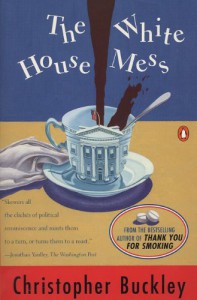twiggreads
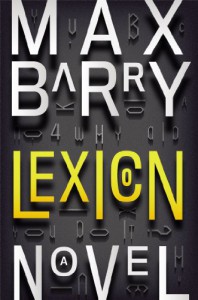 Shorter review than normal:
Shorter review than normal:I LOVED the premise of words holding a power greater than we could imagine. The words in this book don't motivate people to better themselves, they create fear and chaos. One word destroys a town.
I loved the different timelines. You can that one time line is the result of the other but you don't know which came first and then you have to figure out what happened in between.
Lexicon is witty, fast paced, and ingenious.
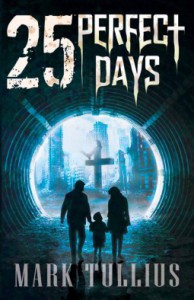 This book deserves a lot more recognition and press than it's currently getting. It's one of the most original books in the genre I've ever read. 25 Perfect Days is realistic. Little changes over time lead to a crumbling society; there isn't One Big Event that occurs.
This book deserves a lot more recognition and press than it's currently getting. It's one of the most original books in the genre I've ever read. 25 Perfect Days is realistic. Little changes over time lead to a crumbling society; there isn't One Big Event that occurs.While the book is made up of 25 stand alone stories, many of the characters appear more than once. This makes the stories more emotional (you get more invested in these characters) and it highlights how short the timeline is.
Tullius seems to love writing part of the story and forcing the reader to connect the dots for themselves. This can be frustrating but the payoff is worth it.
I want to note my favorite story. I forget the name of it (the title expired on Netgalley before I could write it down), but it's the story of the family going to the DMV. Tullius took something as routine and mundane as going to the DMV and with a few short paragraphs makes your blood run cold. Incredible writing.
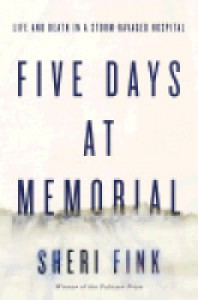 It took me almost a month to get through this book. It's absolutely heart breaking and I needed to stop a lot because I was getting upset and angry.
It took me almost a month to get through this book. It's absolutely heart breaking and I needed to stop a lot because I was getting upset and angry.Five Days at Memorial is the story of a hospital during and after Hurricane Katrina. The only way to describe those five days is 'colossal failure'. I was telling my dad (an RN) about the book and I actually looked up 'colossal' in a thesaurus because I don't think the word is adequate to describe the severity of the events.
Memorial was not prepared for anything like Katrina. The backup generators were in the basement -- below sea level. The emergency handbook section on volcanos was longer than the section on hurricanes. The corporation that owned Memorial, Tenant, pushed the hospital to rely on FEMA and the National Guard. Both agencies were busy with the entire Gulf region. Tenant also prohibited other hospitals in their corporation from assisting (an Atlanta hospital volunteered to send helicopters, personnel, and supplies to assist evacuation). Those systemic failures, in addition to dozens of smaller failures led to numerous patients dying…and several patients being euthanized.
While Fink tells a very, very important story and doing so requires a lot of space, this book is weighed down by a lot of unnecessary details. About a third of the way through, Fink writes about triage. Describing the basic concept of triage and leading into how the doctors at Memorial had no pre-set plan is important. Writing about how the word 'triage' comes from the French sorting coffee beans is not important and it doesn't add anything.
The book straddles the line of a novel (wants to give you as much information as possible) and a case study (only gives you what you need) and the result is 400 dense pages.
I wish Fink wrote more about Charity Hospital. This hospital was mentioned towards the end as a counterpoint for the failure of Memorial. Fink wrote "approximately twice as many patients and fewer than twice as many staff members were present at the public hospital's two campuses as compared with Memorial. However, only three patients died." I think theirs is an important story that we can learn from.
 Charbonneau accomplished a rare feat: she was able to start a sequel without a giant (and often mind numbing) overview of what happened in the first book. There were several months and about a dozen books read between The Testing and Independent Study and it took no time to go back into Cia's world.
Charbonneau accomplished a rare feat: she was able to start a sequel without a giant (and often mind numbing) overview of what happened in the first book. There were several months and about a dozen books read between The Testing and Independent Study and it took no time to go back into Cia's world.Cia has completed The Testing so now she's in school. We skip the first 6 months and skip to a final test, the test that places the students into concentrations. To her surprise, Cia isn't placed into engineering or science, she's placed into government. She is also then assigned a higher amount of classes than her students and then placed into a demanding (but most prestigious) internship. Several adults tell her that they have great faith in her abilities and her student advisor reinforces that those messages were warnings, not praise. Cia is being tested again. She saw what happened to her other classmates so she knows what failure means.
I loved I also loved that Cia had to balance an internal struggle, not just the external issues I discussed above. At the end of the last book Cia found a recording of what happened during the Testing, made in case she didn't outsmart the memory wipe. Cia now has to balance what she knows and what she thinks she knows when she isn't supposed to remember anything at all. It's a great tool for her because she can learn from past mistakes and is able to read between the lines but it also means that everything she says has to be guarded. If she reveals she knows more than she should, both her and her family are in trouble.
I also loved that this book explored Cia's growth without Tomas. Tomas is a great character but having a girl's development come from a boy is cliche and silly.
I wish this book didn't have a physical challenge. While the "bonding" exercise isn't nearly as physical (or deadly) as The Testing and it reinforces the idea that life outside city boundaries can be dangerous, it seems receptive to make the students go through another physical challenge.
I think the goals of the challenge could have been accomplished with a visit from the students' families. It would have been heartbreaking for Cia's family to see how much she's changed and it would have reminded Cia how high the stakes really are.
Basically: Read this series.
 I usually don't comment on books I abandon, but I'm making an exception.
I usually don't comment on books I abandon, but I'm making an exception.I wanted to love this book. I love the idea of a therapist writing a blunt relationship advice book. Setting up that premise took 28 pages. The next 70 were about planning and attending a fundraising party. Nothing of note happened for 100 pages.
My biggest issue was the adult-gossip-girl voice the narrator has. It's hard for me to read a book when I hate the main character (but not impossible. See: Close My Eyes). Grace spent a good amount of time complaining that she only has one Birkin bag (bags that retail for $5k+) and other women have more! And hers is ONLY leather. Again, this is bag that costs 2 months gross salary for me.
And then there was the incident where after dropping of her son for a party, the hostess said that the doorman could hail a cab for Grace. Grace then felt "a queasy feeling, like a twister-tossed girl from Kansas emerging into unreal Technicolor". The hostess didn't know Grace has lived in upper-crust New York her entire life. She had a doorman too! Did this mom think Grace was less than fabulously wealthy??
I had to stop when Grace and Co's reaction to a woman's murder wasn't sympathy for the woman's children and family, it was scrambling to distance this woman from their perfect private school. They decided that since the deceased's son attended on a scholarship, he wasn't a full student. Their reputation was kept intact. Because that's what mattered most.
 (actual review is 3.5 stars, rounded up)
(actual review is 3.5 stars, rounded up)I found this book on the floor of the BEA exhibit hall. Somebody's mistake led to me reading a book I would have never picked up for myself. Tandem is the story of a girl who is pulled into a parallel Earth to stand in for a missing princess. I usually stick to dystopian/sci fi novels so a story about parallel universes and princess is outside my norm.
Sasha is a great character. She's a mix of strong and weak traits (too many authors lean to one side and humans are always a mix). One of the other reviewers stated that Sasha cried too much. I don't think it was that much. If you were kidnapped and taken to another universe…you'd cry a bit too!
Other authors would have gotten lost in exposition but Jarzab kept the plot moving.
I had to take off a star because Tandem fell into the cliche of a love triangle and trilogy.
 Heads in Beds is like lunch with a friend. You're not going to discuss anything super heavy, you're gonna laugh and talk shit about the people around you.
Heads in Beds is like lunch with a friend. You're not going to discuss anything super heavy, you're gonna laugh and talk shit about the people around you. Tomsky is a great storyteller. Sure, names are changed and things may be exaggerated, but you're still laughing.
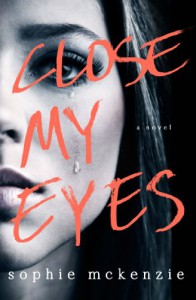 It’s strange. I loved this book, but hated the main character.
It’s strange. I loved this book, but hated the main character. Gen is whiny. Maybe it’s because I’ve never lost a child, nor do I want them at all… I couldn’t connect with her. Gen is also the least developed character in the story.
Even though the narrator constantly annoyed me, I had trouble putting down this book.
Some of the twists are oblivious and you can see them coming from a mile away. Some come out of nowhere and knock you off your ass.
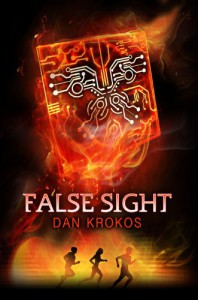 I got this book at BEA, but didn’t know it was a sequel. I tore through False Memory, and then inhaled False Sight.
I got this book at BEA, but didn’t know it was a sequel. I tore through False Memory, and then inhaled False Sight.False Sight completely changes what you learned in False Memory about Miranda and co.
False Memory focused on Miranda and her immediate group. False Sight focuses on more on the full scope of the Roses and their purpose. Will there be a 3rd book??
 I have a lot of mixed feelings about this book. I loved the premise (though this book was a bit outside my norm so maybe it's actually unoriginal) and I liked the timeline of going back and forth between the present time and the beginning of the marriage.
I have a lot of mixed feelings about this book. I loved the premise (though this book was a bit outside my norm so maybe it's actually unoriginal) and I liked the timeline of going back and forth between the present time and the beginning of the marriage.But this book didn't grab me. I think the biggest mistake was not setting up any possible suspects. Without promising and interesting leads, a lot of the book was just stalling until the ending could be announced.
 This book haunts you for awhile.
This book haunts you for awhile. The main character is Mia, and unlike most of her friends, she remembers a life outside Edenton. She's growing up in a world she hates, but she can't leave it. And life is generally peaceful, so she dreams but doesn't act. But that's until something awful happens, and she blames herself for it.
The description at the top focuses on the romance of the book. Romance between Mia and Gabriel is a major theme, but I was more intrigued by the cult.
Escape from Eden is one of the few books so far this year that I've stayed up late and read during lunches so I find out what happens next.
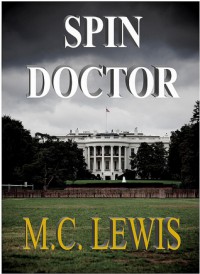 Spin Doctor is the story of Jack Abbott, who is kind of an asshole. But he's charismatic and you feel bad for him a lot so you keep reading and you end up rooting for him by the end of the novel.
Spin Doctor is the story of Jack Abbott, who is kind of an asshole. But he's charismatic and you feel bad for him a lot so you keep reading and you end up rooting for him by the end of the novel.If you're not up to date on DC acronyms and lingo, you're going to struggle a bit. But if you like The West Wing and Veep, you're going to like Spin Doctor.
